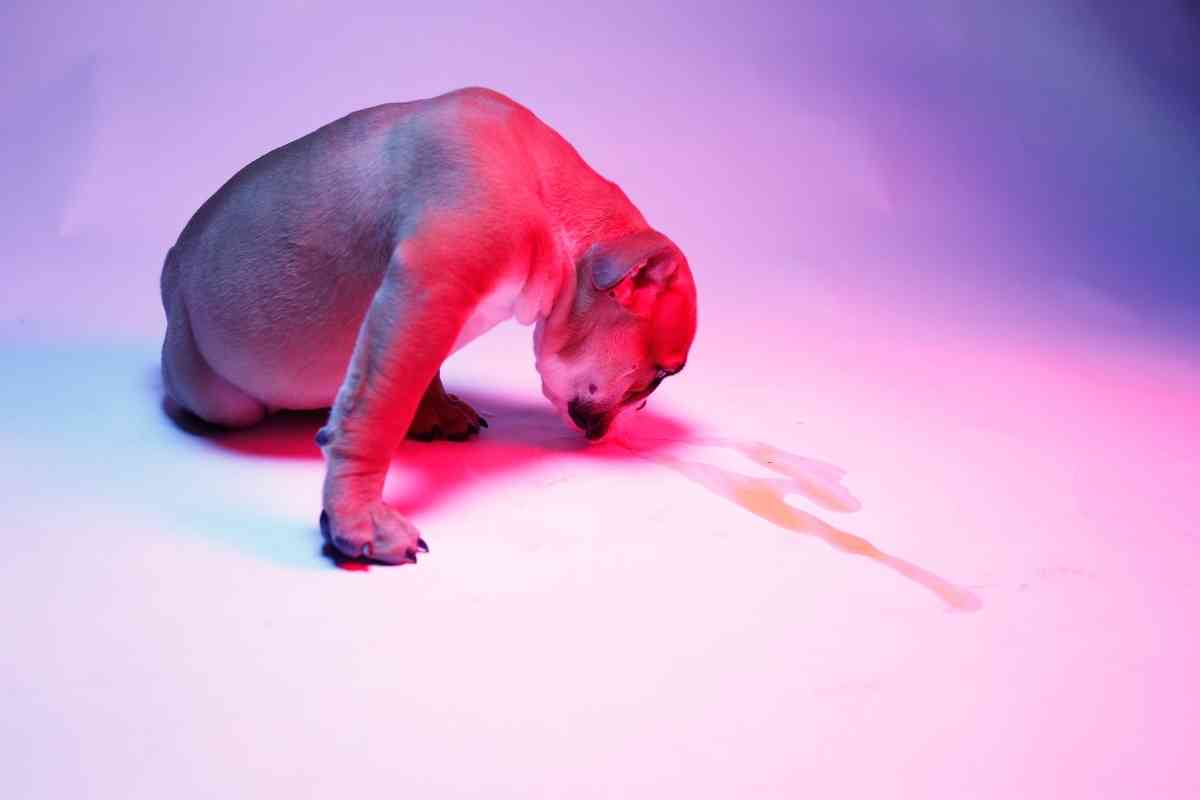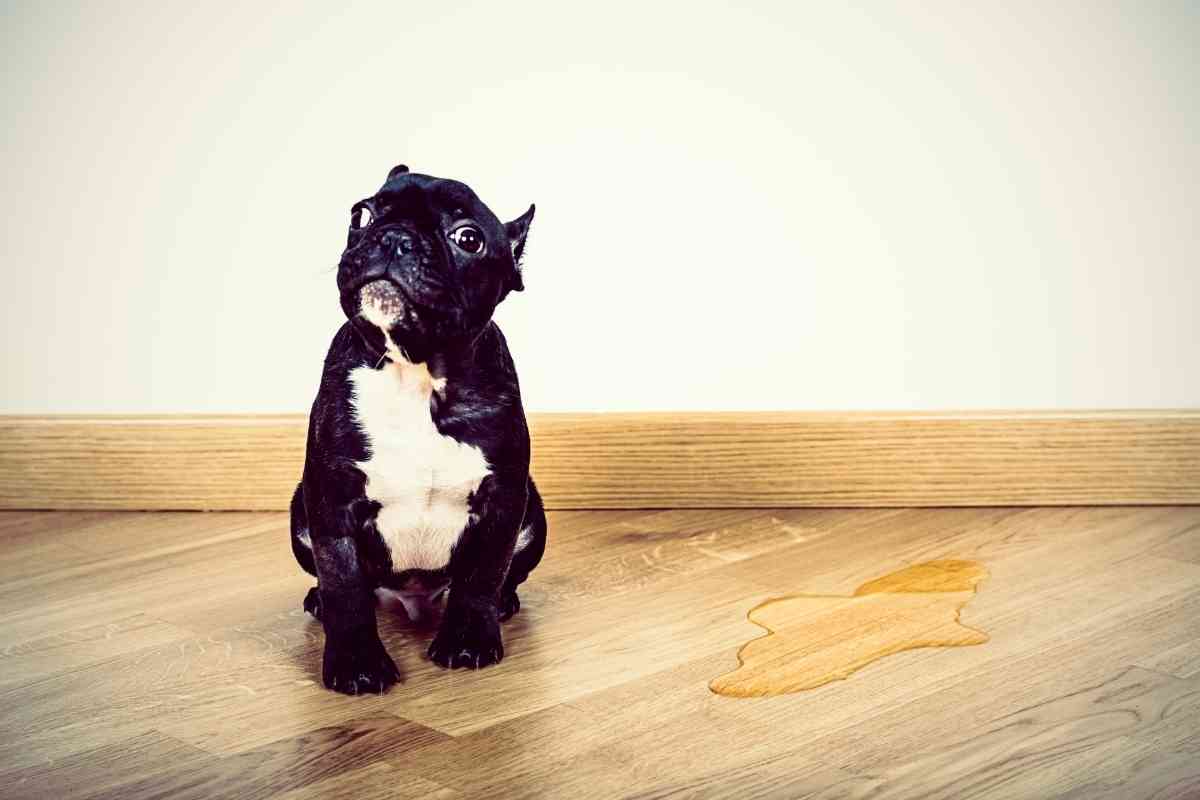Why Does My Puppy Pee Inside After Being Outside? Spite?
Most dogs have an easy time potty training, and you may ask yourself, “why does my puppy pee inside after being outside?” No one will warn you about this, and you should prepare for accidents. Puppies may pee again inside the house after a successful potty outside. The experience can be frustrating and require regular cleaning up. Most dog owners also fear that their dogs may develop a permanent habit of peeing inside the house.

Why Does My Puppy Pee Inside After Being Outside?
Puppies pee inside the house because they are not thoroughly potty trained, have medical conditions such as UTIs, fail to empty the bladder outside, and have substrate preferences. Behavioral, medical, and training-related issues can cause your dog to pee inside.
Once you identify why your puppy pees inside after a walk, you will successfully resolve the behavior by establishing how you can help them stop peeing in the house.
With insights from experts and dog parents’ experiences, we have compiled information on the common reasons your puppy can pee inside the house after being outside and how to stop them.
Reasons Why Your Puppy Pee Inside After Being Outside
It is frustrating when your puppies relieve themselves outside when peeing and going potty inside again. However, you can resolve it.
Common reasons for inappropriate peeing behavior include medical issues like UTI, incomplete potty training, substrate preferences, bad weather, and lifestyle changes.
Identify why your dog is peeing inside and execute the remedies such as medication and consistent potty training to resolve the problem.
Medical Conditions
Common medical issues that cause peeing issues include kidney issues, UTIs, internal parasites, gastrointestinal problems, and hormonal conditions like Cushing’s disease.
Various medical factors may cause your puppy to frequently urinate, including peeing inside after being outside. The most common cause of frequent urination in dogs is urinary tract infection, often accompanied by other signs like releasing a few drops of urine, pain when urinating, and blood in the urine.
While not common in puppies, diabetes symptoms are similar to those in older dogs. If your puppy has diabetes, they will experience increased urination as their bodies try to eliminate excess sugar through urine.
Kidney disease in puppies causes frequent urination and drinking. Often dogs have accidents and may urinate inside the house even after a walk. Their body increases blood flow to the kidneys to increase the toxins removed, resulting in more urine production.
Most puppies with Cushing’s syndrome experience excessive thirst and urination for a long time because of excess urine volume.
Inappropriate peeing could result from health issues, and you should visit a vet when your puppy starts exhibiting unusual urinating behavior. A urinalysis and other tests will confirm infection, and get a prescription for antibiotics and other treatments to solve problems causing your puppy to pee frequently and in the house.

Training- Related Issues
Puppies pee inside when they are not entirely potty-trained. Often dog parents expect their puppies to be responsible too soon. You may go for days without accidents and suddenly come across urine on your carpet.
Potty training takes some time before leaving your dog in the house unsupervised. Most dogs are entirely potty trained in six months. Your consistency in training and your dog’s personality can also determine how long it will take.
Don’t get discouraged if your puppy still has accidents over six months of potty training. Continue house training consistently and take your puppy outside for potty breaks every 30 minutes. With time, continue extending the time between potty breaks.
Most pet parents consider their puppies fully potty trained when they have zero accidents in the house.
Substrate Preferences
If your puppies pee inside the house after a walk, they may be demonstrating substrate preference. It develops at a young age when your puppy starts to pee. Their brain records the smell and feel of the surfaces they pee on; the location then stimulates them to urinate.
Due to substrate preferences, your puppy could have accidents on mats, carpets, and other areas in the house.
Dogs can unlearn this and prefer peeing on other surfaces and locations outside the house. You can change your puppy’s substrate preference from the carpeted areas in your home to grass or soil outside.
You can change your puppy’s substrate preference during potty training and eliminate lingering odors in the house.
Your Puppy Does Not Empty the Bladder When Outside
When your puppies fail to empty the bladder when outside, they will finish peeing when you go back inside. This could happen if you are distracting your puppy or praising them prematurely.
Excitement or anxiety can interfere with urine flow and will not finish urinating as they should.
Some dogs will not focus on peeing when there are leaves and squirrels to run after. Give easily distracted dogs extra time to empty their bladder.
Observe your puppy’s body language. If your dogs look around vigilantly and constantly, they are nervous and may feel uncomfortable. Look for a spot in the backyard where they feel safe and less vulnerable when going potty.
Avoid praising and giving your dog treats too early during potty. Also, keep treats out of their sight as your puppy may get too excited for the treat and not fully empty the bladder.
When your dog is peeing, do not move away. You could tempt your dog to stop peeing and follow you. When you go for a walk and your dog pees, stay a little longer before you go inside to give your dog another opportunity to empty the bladder before going inside.
Ensure the potty area you take your puppy to is not challenging or stressful. When relaxed, dogs go to the bathroom and empty their bladder.
Bad Weather
Puppies have not had much experience with elements like rain and snow. Due to lack of exposure, they may be reluctant to go potty outside.
Most dogs do not like to get rained on and wet paws. Walking on wet earth can make them avoid peeing outside. The experience may worsen if you have not trained your puppy.
Most puppies push back from peeing outside during unfavorable weather, and pet parents should find ways to work around it.
If you live in areas prone to bad weather, you can train your puppy to pee outside even in bad weather at a young age. You can get your dog accustomed to bad weather and wet paws by creating positive experiences.
For instance, you can serve meals in their bowls and place them on wet grass. Walks in the rain can also get your puppy used to the weather and a wet coat.
Alternatively, you can make your dog comfortable when you go out in the rain or snow by getting quality gear. Dog boots and a raincoat can minimize contact with wet surfaces, making them comfortable to pee when there is a downpour outside.
Lifestyle Changes
A change of home and lifestyle can affect your puppy’s potty routine. New pets, guests, changes in diet, and walk schedules can create elimination issues.
For instance, if it takes 2 hours longer before your dog gets a potty break, they are likely to pee inside.
Puppies urinate on spaces they consider theirs to “mark their territory,” especially if they have a new canine sibling. Dogs mark if they feel another dog is encroaching on their territory.
If you have a new puppy, consider keeping your dogs in separate rooms inside the house and taking them on walks together until they are comfortable before you throw them in together.
Lifestyle changes can cause anxiety or excitement, which affect urination. Diet changes can also affect the volume of urine produced. If you anticipate changes, start making adjustments and transition in advance. Give your dog time to acclimate to the changes and start potty training again if necessary.